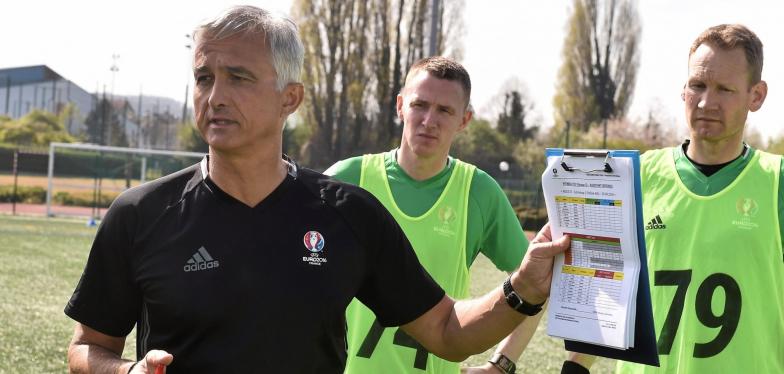KU Leuven is getting referees ready for the European Championships
KU Leuven is responsible for the supervision of the referees during the coming European Football Championships in France. Professor Werner Helsen (Kinesiology and Exercise Science) and his team will ensure that the referees will appear on the field not only physically fit and fresh, but also mentally strong.

Helsen explains that nowadays top referees are as much athletes as the top footballers themselves. "During a game, a referee covers the same distance as a player, but does it with more activity changes, transitioning between standing still, walking, jogging, high intensity running and sprinting, and that every 4 seconds. Every 2 to 3 seconds they make decisions which could determine the game. It's best if those decisions are made less than 15 metres from the action. To be there at all times, you have to be extremely fit."
Professional supervision is therefore certainly no luxury. The most experienced referees are usually a bit older than the players, between 40 to 45 years old. Moreover, during the European Championships only the best referees in Europe are at work and they are also deployed during the top competitions of the UEFA and in their own country. So like the players, they have just gone through an entire football season. It is important that they stay fresh and fit during the European Championships.
Since April, 13 specialists of the KU Leuven have been constantly monitoring the referees. Sports scientists, fitness coaches, doctors, physiotherapists and masseurs are all involved. The team makes use of the software of TopSportsLab, a spin-off of the university, which is often used by football and field hockey teams. This software provides each referee with individual tailor-made feedback. Among other things, a risk profile for injuries is compiled. Consequently, the exercises the referees receive are tailored to their problem areas. The 18 referees were observed like this since the winter training in 2012.
The supervision goes beyond the physical. The referees must also stay mentally strong to be able to take decisions within a fraction of a second. Post-doctoral researcher Koen Put, who is part of professor Helsen's team, developed an app the referees can use to improve their observations and decisions. The app consists of a number of video clips containing scenes which might or might not be offside. After the referees have made a decision, they see the right answer and receive feedback, including images in slow motion. Through this app, they learn and how to compensate the limits of human observation and the slow processing speed of the brain. Analyses show that regularly practising with the app leads to 20 to 25% more accurate decisions on the field.
This means that the referees will be optimally prepared, both physically and mentally. If our Red Devils will also be in top form, we can enjoy the European Championships twice as much.